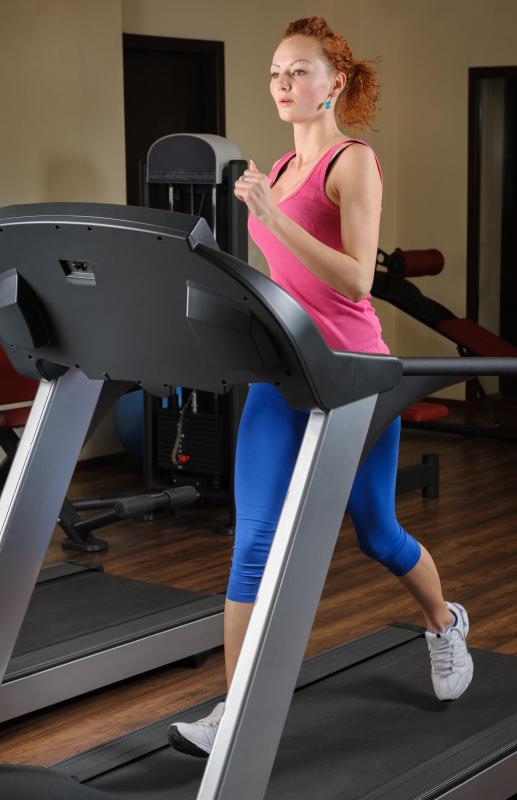At WiseGEEK, we're committed to delivering accurate, trustworthy information. Our expert-authored content is rigorously fact-checked and sourced from credible authorities. Discover how we uphold the highest standards in providing you with reliable knowledge.
What are Sports Drinks?
Sports drinks have become popular beverages with athletes and those on the go constantly. Designed to replenish the body with electrolytes and nutrition as well as keep it hydrated, a sports drink can help you recover from activity more quickly and exercise longer. Yet the sports drink market puts many unhealthy versions out for consumers, which usually are extremely high in calories and sugar.
The original sports drink is hard to pinpoint, as the concept has been around for many centuries. Field workers and ranchers in North America used to drink a concoction of water, molasses and vinegar to invigorate themselves during harvest. The goal of sports drinks is to provide water and give the body additional minerals that can help the muscles, such as potassium. Sugar is also necessary, not for taste but rather for the beneficial effect it has on the muscles and endurance.

While some sports drinks have only well-known minerals and added ingredients, others throw in a host of questionable ingredients. Some major brands of sports drinks will add a whopping dose of caffeine, which can make you jittery and cause nausea or vomiting in some people during intense workouts. Others add supplements that have an uncertain effect, such as chromium, which may or may not help your body.

Before purchasing a sports drink, look carefully at the calorie content on the label. Be sure to check the serving size as well, as some bottles can contain up to 3 servings of the drink. If you are trying to lose weight, drinking a sugary sports drink may be counterproductive, even though you are exercising to burn calories. Even if your drink has only 100 calories, imagine how much longer you will have to be on the treadmill to work that off on top of your usual workout.

Most sports drinks come in a variety of flavors, from lemon-lime and orange to a somewhat unidentifiable blue. Rather than being reminiscent of juice, these flavors mostly taste like fruit punch or similar artificially flavored drinks. Because of the sodium in most sports beverages, additional flavoring may be used to cover up the salty taste. Even so, some drinks have a perceptible salt flavor.

Some experts suggest that sports drinks should be used to prevent rather than treat dehydration and fatigue. Try drinking about a quarter of the bottle before you start exercising, and drinking more every 15-20 minutes. Do not wait until you are parched or exhausted to start drinking, it is an excellent way to end up fainting or over-exerting yourself.

There are dozens of sports drinks to choose from, available at grocery stores and many fitness centers. Most are priced between $2-$4 US Dollars (USD) per bottle, but consider buying in bulk if you are exercise frequently. Sports drinks are often recommended for those doing strenuous or endurance exercise; for moderate work outs, plain water will probably give you the proper amount of hydration, and has no calories or sugar.
AS FEATURED ON:
AS FEATURED ON:















Discussion Comments
@ Nastruium: Obviously more than just marathoners need to replace electrolytes and fuel. Ever play a sport, like soccer, where you run (a lot) - or sweat like a pig on a hot day on the tennis courts?
I agree that water should do when you have the fuel from your last meal or snack still available in your liver (glycogen); but for competitive sports, one often needs to regain more than just water during the sport - and shouldn't divert blood from the muscles to the stomach, like you would with a banana or other food.
As the author has submitted brand names in some of these articles, I hope I can mention one - as I have no affiliation or profit motive here. just personal experience: Shaklee Performance (sports drink)has more science behind their product than any other company.
I agree that only people who exercise long and hard need sports drinks, but this includes many farm and construction workers, long distance bicycle riders, cross country runners, many team sports players, etc.
I avoid commercial sports drinks because of the empty calories, chemical additives, disposable plastic bottles and high costs. My recipe for an apple juice and vinegar sports drink tastes better than the traditional molasses and vinegar drink used by field workers.
It's too bad that so many people use sports drinks - they really should only be for marathoners. No one else needs them - they end up being empty calories!
Post your comments